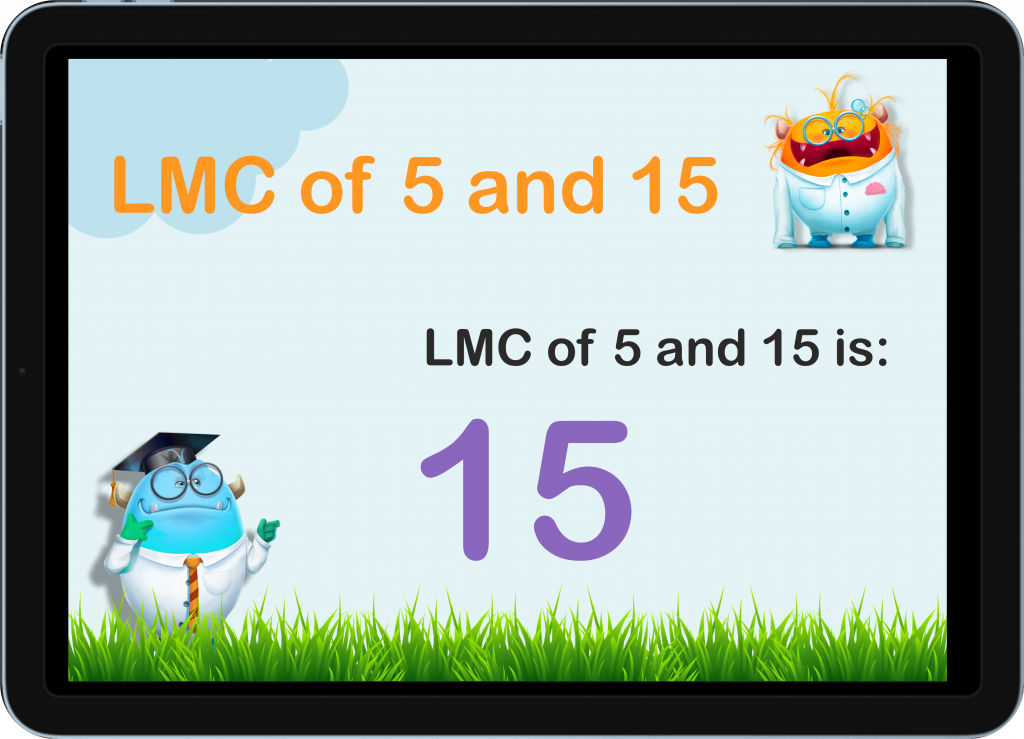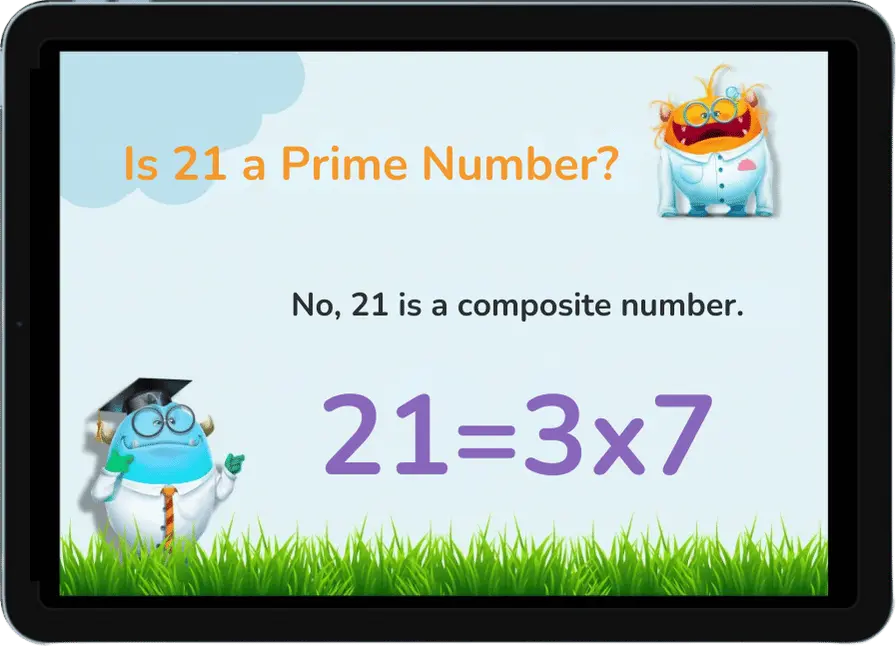Is 2 A Prime Number?
Prime vs. Composite Numbers
Greetings, young math enthusiasts! Today, let’s set sail on a mathematical voyage to determine if 2 is a prime number, and learn more about the difference between prime and composite numbers.

Is 21 a Prime Number?
Or is 21 a Composite Number?
Ever wondered if 21 is a prime number or a composite one? Well, you’re in for an adventure! Let’s dive into this mystery together and discover what makes 21 so special. Buckle up for a fun and exciting journey into the world of numbers!


No credit card required

No credit card required
What Are Prime Numbers?
Is 21 a Prime Number?
Why is 21 Not a Prime Number?
Why is 21 a Composite Number?
What are the Factors of 21?
What Type of Number is 21?
Is 21 a Semiprime Number?
What is So Special About Number 21?
Conclusion…
What Are Prime Numbers?
A prime number is a unique type of number that can only be divided evenly by 1 and itself. Imagine prime numbers as independent individuals; they only have two divisors: 1 and themselves. Examples of prime numbers include 2, 3, 5, 7, and 11. These numbers cannot be split evenly by any other numbers besides 1 and the number itself.
Is 21 a Prime Number?
Now that we know the basics, let’s zoom in on our star of the day: the number 21. Is 21 a prime number? The short answer is no, it isn’t. But why not? To find out, we need to look at what numbers can divide 21 evenly.
Why is 21 Not a Prime Number?
To determine whether a number is prime, we check to see if it has any divisors other than 1 and itself. For 21, we need to see if there are any numbers that can divide 21 without leaving a remainder. When we do the math, we find that 21 can be divided by 1, 3, 7, and 21. This means it has four divisors.
Since a prime number can only have two divisors—1 and itself—21 does not fit this definition. Therefore, 21 is not a prime number. It is a composite number because it has more than two factors.
Is 21 a Composite Number?
Yes, 15 is definitely a composite number. Remember, a composite number has more than two factors. For 15, those factors are 1, 3, 5, and 15. So, it fits right into the composite number party with all its friends!
What Can 21 be Divided By?
To understand why 21 is not a prime number, let’s break it down through prime factorization. Prime factorization is the process of expressing a number as the product of its prime factors. For 21, this means finding which prime numbers multiply together to give us 21.
We start by dividing 21 by the smallest prime number, which is 2. Since 21 is odd, it cannot be divided by 2. Next, we try 3, which is the next smallest prime number. When we divide 21 by 3, we get 7. So, 21 divided by 3 equals 7, and 7 is a prime number. This means that the prime factors of 21 are 3 and 7. We can write this as:
21=3×7
This prime factorization shows that 21 is made up of two prime numbers multiplied together.
What Type of Number is 21?
So, what type of number is 21? Let’s categorize it:
- Composite Number: As mentioned earlier, 21 is a composite number because it has more than two factors.
- Odd Number: 21 is an odd number because it cannot be divided by 2 without leaving a remainder.
- Natural Number: 21 is a natural number, which means it is a positive integer used for counting (1, 2, 3, 4, …).
- Whole Number: 21 is also a whole number, including all natural numbers and zero.
- Rational Number: 21 is a rational number because it can be expressed as a fraction (21/1).
Is 21 a Semiprime Number?
Now, let’s explore another interesting category: semiprime numbers. A semiprime number is a natural number that is the product of two prime numbers. This can include the product of the same prime number multiplied by itself or the product of two different prime numbers.
As we saw in the prime factorization section, 21 is the product of the prime numbers 3 and 7:
21=3×721 = 3 \times 721=3×7
Since 21 is the product of two prime numbers, it is classified as a semiprime number. This means it belongs to a special group of numbers that are not as simple as primes but not as complex as other composite numbers.
What is So Special About Number 21?
What is So Special About Number 21?
The number 21 has some pretty cool and interesting facts associated with it:
Blackjack: In the card game Blackjack, the goal is to get your cards to add up to 21 without going over. This makes 21 the “winning number” in this popular casino game.
Legal Drinking Age: In many countries, including the United States, 21 is the legal drinking age. It’s a milestone birthday that signifies reaching adulthood.
Mathematics: 21 is the sum of the first six natural numbers (1 + 2 + 3 + 4 + 5 + 6 = 21). It is also a Fibonacci number, being the 8th in the sequence: 0, 1, 1, 2, 3, 5, 8, 13, 21.
Sports: In table tennis, a standard game used to be played to 21 points before the rule changed to 11 points. Some variations of badminton also play to 21 points.
Culture: The 21st century began on January 1, 2001, and will end on December 31, 2100. The number 21 represents a new century and is often associated with futuristic ideas and advancements.
Music: The song “21 Guns” by Green Day is quite popular. Also, Adele’s album “21” was a massive hit and won numerous awards.
Dice: Rolling a combination of 21 with two six-sided dice is impossible, but it’s a significant number in various dice games, symbolizing a high score.
Symbolism: In some spiritual contexts, the number 21 is seen as a symbol of new beginnings and change.
These fun facts show that 21 is more than just a number; it has a significant place in games, culture, and even mathematics!
In Summary
21 is not a prime number because it has more than two factors. It can be divided by 1, 3, 7, and 21. Through prime factorization, we see that 21 is the product of the prime numbers 3 and 7, making it a composite number. Additionally, 21 is an odd, natural, whole, and rational number. It also falls into the category of semiprime numbers because it is the product of two prime numbers.
Understanding the classification of numbers like 21 helps us appreciate the fascinating complexity of mathematics. Keep exploring and discovering the wonders of numbers, and you’ll find that math can be a thrilling adventure!
Learn More About Prime Numbers
© 2024 Smartick. All Rights Reserved.
